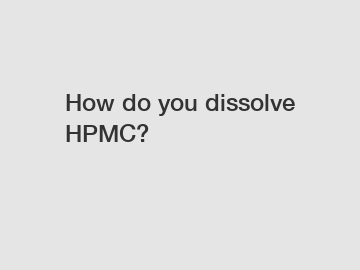How do you dissolve HPMC?
Google Hot Topics: How Do You Dissolve HPMC?
Have you ever wondered how to dissolve Hydroxypropyl Methylcellulose (HPMC)? If so, you're not alone. HPMC, also known as hypromellose, is a commonly used ingredient in various industries, including pharmaceuticals, construction materials, and personal care products. It is widely utilized for its unique properties, such as thickening, stabilizing, and film-forming. However, when it comes to dissolving HPMC, several factors come into play. In this article, we will explore the methods and factors involved in dissolving HPMC and provide some useful tips to facilitate the process.
1. Understanding HPMC - Before delving into the dissolution process, it's essential to have a basic understanding of HPMC. This cellulose derivative is created through the chemical modification of cellulose, a naturally occurring polymer found in plants. HPMC is available in various viscosity grades, allowing for customization based on specific application needs.

2. Solubility of HPMC - HPMC has limited solubility in most solvents, and careful consideration is required when selecting the appropriate solvent. Water is the most commonly used solvent as it readily dissolves HPMC, especially at elevated temperatures. However, remember that the solubility of HPMC can vary depending on the grade, concentration, and temperature of the solution.
3. Temperature and Dissolution Time - Manipulating the temperature can significantly affect the dissolution process. While room temperature water can dissolve HPMC, increasing the temperature accelerates the dissolution rate. Heating the solvent to around 50-60°C can aid in dissolving HPMC more rapidly. However, keep in mind that excessively high temperatures may lead to gelation or degradation of the polymer.
4. Agitation - Agitation or stirring is another crucial aspect to facilitate the dissolution of HPMC. By stirring the solution, you enhance the interaction between the solvent and the polymer, allowing for faster dissolution. Use a mechanical stirrer or overhead stirrer to achieve uniform mixing and speed up the process.
5. Concentration and Grade of HPMC - The concentration and grade of HPMC can impact its solubility. Generally, lower viscosity grades dissolve more easily compared to the higher viscosity ones. Additionally, controlling the concentration of HPMC in the solution can affect its dissolution rate. Higher concentrations may require more time or elevated temperatures for complete dissolution.
6. pH and Salts - The pH of the solution can influence the dissolution of HPMC. In most cases, HPMC dissolves more readily in neutral to slightly alkaline pH ranges. If you are experiencing difficulty in dissolving HPMC, consider adjusting the pH using weak acids or bases as necessary. Similarly, the presence of salts in the solution can impact the solubility of HPMC. Salts with higher ionic strength might reduce the solubility of the polymer, so it is important to consider their presence when dissolving HPMC.
7. Solvent Compatibility - Apart from water, other solvents like alcohols (e.g., ethanol or isopropanol) can also dissolve HPMC effectively. Different solvents may yield different viscosities and properties upon dissolution, so it's crucial to choose the appropriate solvent for your intended application.
In conclusion, dissolving HPMC involves careful consideration of various factors, including temperature, agitation, concentration, grade, pH, and choice of solvent. By taking these points into account, you can optimize the process and ensure the efficient dissolution of HPMC for your specific application. Whether you're formulating a pharmaceutical product, working with construction materials, or developing personal care items, understanding the dissolution process of HPMC is essential for achieving desired results. So, next time you ask, "How do you dissolve HPMC?" remember to apply these key factors to enhance your dissolution process.
If you are looking for more details, kindly visit MATECEL hpmc, HPMC for tile adhesive, uses of HPMC.
191
0
0

Comments
All Comments (0)